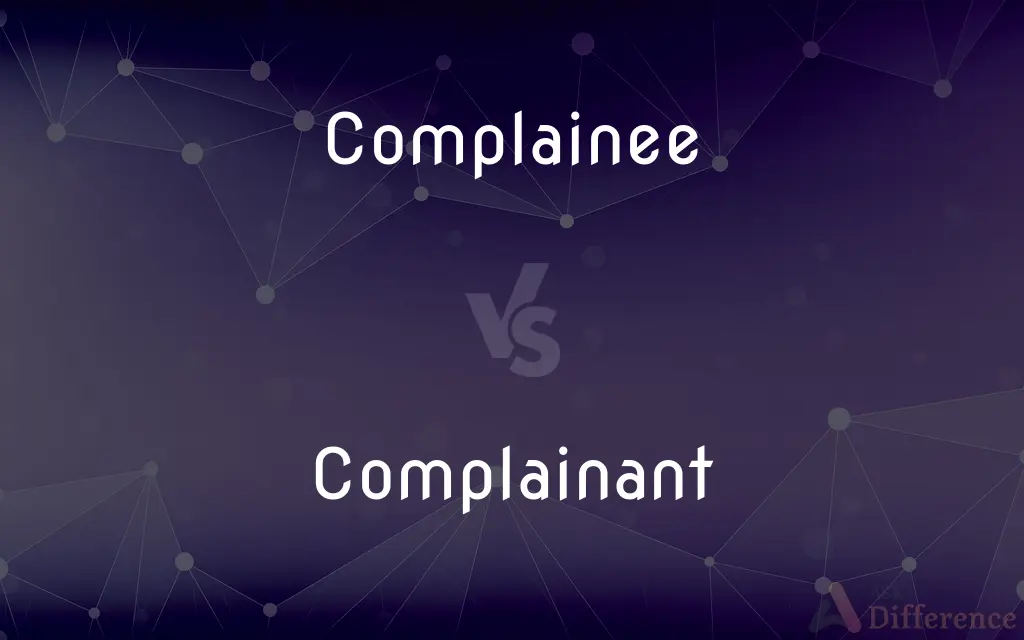Complainee vs. Complainant — What's the Difference?
By Tayyaba Rehman — Updated on October 30, 2023
Complainee is the person or entity against whom a complaint is made, while Complainant is the person or entity who makes the complaint.

Difference Between Complainee and Complainant
Table of Contents
ADVERTISEMENT
Key Differences
Complainee and Complainant are both related to the act of complaining, but they occupy opposite roles in the scenario. The Complainee is the individual or organization that has had a grievance lodged against them. This term is not as commonly used in legal or formal settings, but it's designed to represent the receiving end of the complaint. Conversely, the Complainant is the party that airs the grievance. This is a more recognized term, often found in legal documents or formal complaint procedures.
Complainee, by its very definition, indicates a position of defense or response. When someone becomes a Complainee, they are given the chance or expectation to address the grievance brought forward. On the other hand, the Complainant, being the initiator of the complaint, seeks redress or resolution to a perceived problem or wrong.
From a linguistic perspective, the "-ee" suffix in Complainee often signifies the receiver of an action, like in "employee" (one who is employed) or "payee" (one who receives payment). The "-ant" suffix in Complainant, meanwhile, usually indicates the doer of an action, evident in words like "applicant" (one who applies) or "defendant" (one who defends).
In a practical setting, the Complainee often finds themselves in a situation where they must react or remedy a situation, based on the feedback or accusations of the Complainant. The Complainant, conversely, takes a proactive role, seeking change or correction from the Complainee based on their grievances.
Both terms, Complainee and Complainant, signify integral parts of a complaint process. While one represents the voice of dissatisfaction or concern, the other embodies the subject of such concerns and the potential for resolution.
ADVERTISEMENT
Comparison Chart
Definition
Person/entity against whom a complaint is made.
Person/entity who makes the complaint.
Linguistic Suffix
"-ee" indicating the receiver of an action.
"-ant" indicating the doer of an action.
Role
Defensive or responsive.
Initiating or seeking redress.
Legal Usage
Less common in legal or formal settings.
Commonly found in legal and formal settings.
Relationship to Act
Subject of the complaint or feedback.
Voice of dissatisfaction or concern.
Compare with Definitions
Complainee
The one being accused or reported.
He was the complainee in the property dispute.
Complainant
The party voicing a concern or issue.
The complainant in the case presented substantial evidence.
Complainee
The entity receiving negative feedback.
The software company became the complainee due to software glitches.
Complainant
The reporter of a problem or concern.
He was the main complainant during the community meeting.
Complainee
A person against whom a grievance is lodged.
She was the complainee in a workplace dispute.
Complainant
The person initiating a formal complaint.
She became a complainant when she faced workplace harassment.
Complainee
The individual targeted in a complaint.
The manager was the complainee after the event went awry.
Complainant
An individual seeking redress or resolution.
The tenant was a complainant regarding the broken heating system.
Complainee
The receiver of a filed complaint.
The local council was the complainee after the community's uproar.
Complainant
One who raises a grievance or expresses dissatisfaction.
The customer was a complainant about the faulty product.
Complainee
One who is complained about; the subject of a complaint.
Complainant
A plaintiff in certain lawsuits.
Complainant
A plaintiff.
Complainant
A prosecuting witness in a criminal case.
Complainant
A person who files a formal accusation or brings a formal charge.
Complainant
(legal) The party that brings a civil lawsuit against another; the plaintiff.
Complainant
(legal) An alleged victim in a criminal investigation or trial.
Complainant
One who makes complaint.
Complainant
One who makes complaint.
Eager complainants of the dispute.
Complainant
One who commences a legal process by a complaint.
He shall forfeit one moiety to the use of the town, and the other moiety to the use of the complainant.
Complainant
A person who brings an action in a court of law
Common Curiosities
Is the term Complainee commonly used in legal documents?
No, Complainee is less common in legal documents compared to Complainant.
Which comes first, Complainee or Complainant?
Complainee is the one against whom a complaint is made, while the Complainant is the one who makes the complaint.
Can one person be both a Complainee and Complainant?
Yes, in different scenarios or issues, a person can be on both the receiving and giving ends of complaints.
Does Complainant always refer to a person?
No, a Complainant can be an individual, group, or entity.
Can a company be a Complainee?
Yes, if a complaint is made against a company, it becomes the Complainee.
What is the main role of a Complainee in a complaint process?
To address or respond to the grievance brought forward.
Can an organization be a Complainant?
Yes, organizations can also initiate complaints, making them the Complainant.
Which term is more recognized in formal complaint procedures?
Complainant.
Is the term Complainee always related to negative feedback?
While not exclusively negative, it relates to feedback that prompts someone to lodge a complaint.
Who typically has the expectation to address a complaint or grievance?
The Complainee.
Are there any linguistic cues to remember the roles of Complainee and Complainant?
Yes, "-ee" in Complainee indicates the receiver, while "-ant" in Complainant indicates the doer.
Which term indicates the receiver of the complaint action?
Complainee.
Which suffix indicates the doer of an action?
"-ant", as in Complainant.
What drives a Complainant to make a complaint?
Dissatisfaction, perceived wrongs, or the need for resolution.
Which party typically seeks change or correction?
The Complainant.
Share Your Discovery

Previous Comparison
Pole vs. Poll
Next Comparison
Ethene vs. EthyleneAuthor Spotlight
Written by
Tayyaba RehmanTayyaba Rehman is a distinguished writer, currently serving as a primary contributor to askdifference.com. As a researcher in semantics and etymology, Tayyaba's passion for the complexity of languages and their distinctions has found a perfect home on the platform. Tayyaba delves into the intricacies of language, distinguishing between commonly confused words and phrases, thereby providing clarity for readers worldwide.















































